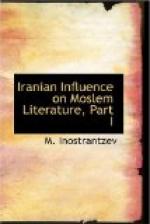Ibn Moqaffa exchanged the religion of his Persian fathers for Islam only in his mature years,—certainly not because he saw in the latter perfect verity but because probably he was not satisfied with Zoroastrianism with which he was intimately familiar or with any of the other religions which in his time flourished openly or in secret in Iraq which was “the heart of the Empire”. To such a man the scepticism of our section is natural, a fact which does not make it impossible that certain principles which were common to all the religions intimately known to the author remained also self-evident to Ibn Moqaffa,—such as God as the Creator, and the next world with its reward and penalties. Had Ibn Moqaffa, in his own name confessed to such religious doubts publicly no patron could have saved him from capital punishment. On the other hand he ran no risk in ascribing the questionable exposition to the Persian long since dead, who, however, supposing that he harboured such doubts could not have given expression to them as a physician attached to the Imperial Court of Persia. The belief in an inexorable fate which is evident in this chapter as well as in the entire portion attributable to Ibn Moqaffa could have been cherished, no doubt, also by a Mazdyasnian. This doctrine, therefore, speaks neither for nor against the authorship of Ibn Moqaffa. Equally far from decisive is the exhortation to pure morality which finds expression there.
I am confirmed in my view that the passage on the unconvincing nature of religions proceeded from Ibn Moqaffa by a few couplets in the Shahnama. (Mohl vol. 5, 53 ff; Macan 1293). The king of India called Kaid has several dreams which are interpreted to him by the sage Mihran. The third dream, about four men pulling at a fine piece of cloth, each towards himself, without tearing it, is thus explained by him:
“Know that the piece of cloth is the religion divine end that the four men who pull at it have come to preserve it. One of the religions is that of the Dihkans, the fire-worshippers, who may not take in hand the Barsom without pronouncing the prayer formula.
“[The Dihkans were properly speaking the small landed nobility of the Sasanian times and as such were representatives of the ancient Persian religion; barsom and the prayer formula or baz are well-known components of their ritual.]
“Another religion is that of Moses, which is called the Jewish religion, maintaining that none besides itself is worthy of praise; the third religion is of Greece, belongs to men of piety and brings equity to the heart of princes (this is Christianity). The fourth is the pure faith of the Arab which raises the head of the intelligent out of dust. Thus they struggle for the preservation of their religion and pull the cloth towards the four sides away from each other and become enemies for the sake of religion.”
[Sidenote: Ibn Moqaffa no sincere Muslim]




